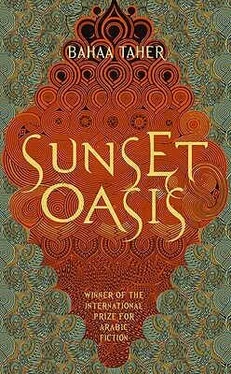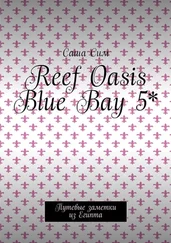He fell silent.
The same day, Sheikh Sabir visited me for the second time since Ibraheem's injury. The first time he came to thank him and me for saving young Mahmoud, and this time he came in the company of some of the other sheikhs and the boy's relatives, who were Easterners, to call on Ibraheem. I couldn't concentrate enough to hear what he was saying and I couldn't understand what they were discussing in their own language as they surrounded the unconscious Ibraheem's bed, his pale face bathed in sweat. I was in almost as bad a state as he, and scarcely able to take anything in.
Sabir noticed my condition, however, pulled me aside by the hand, and started talking volubly, though I could barely see him. I replied despairingly to what he had said by exclaiming, 'Sheikh Sabir, Ibraheem is dying,' but then I realized that he was saying, 'No. He will live, God willing.' He was talking and I tried to concentrate. He was saying, 'This is not the first time someone's leg has been broken in the oasis, or someone has had a fever, and they have people who can treat such conditions.' 'Who are they?' I asked. 'The people who treat our own sick and wounded,' he replied. 'Don't we too get sick? And those leeches that you put on his leg will do him no good and may harm him. They draw off the blood in cases of headache but do not cure wounds. Whoever told you to apply them was wrong. Let the man I was telling you about take care of him.'
So he'd also been talking about a man? I said, 'And what if he dies, Sheikh Sabir?' and he replied, 'That too would be the will of God.'
I had no other solution.
The nurse told me that 'with Your Excellency's permission' he'd take no responsibility for what might happen. They were making Ibraheem drink things he knew nothing about and they'd torn the bandage off his leg and were putting oils and ointments on the wound that might increase the putrefaction. I asked him again, 'Are you capable of amputating his leg?' and he answered, 'I couldn't take that responsibility, Excellency.'
Catherine followed the news of Ibraheem's condition with concern and would ask me about him in the brief moments when I went home to change my clothes. When she heard I'd handed his treatment over to the Siwans, she protested. 'I agree with the nurse's opinion,' she said. 'What can primitive medicine do in a case like this? It really is blood poisoning, in the leg and the body, and there's no treatment except surgery and amputation.'
Exasperated, I said, to make her shut up, 'Would you like to do the operation, Catherine?' and she astounded me by replying, 'I have no objection to trying. Perhaps I could help the nurse. I have some idea of nursing too.' Preparing to leave, I said, 'The nurse has relinquished his responsibility,' and she said, 'Then you shouldn't implicate yourself in the killing of poor Ibraheem either.'
I didn't tell her I was already implicated. There was no witness but me to those seconds and perhaps even Ibraheem hadn't noticed them and if he lived would never mention them, but I am the one who always holds myself to account. It astonishes me that Catherine doesn't feel any regret or pangs of conscience. It never occurs to her that everything that happened did so because of her visit to that ill-omened temple on the day of that ominous heat. If only she'd understood what the heat was saying and given up the visit! If only I myself had understood it and insisted we stay at home! But we went and we let young Mahmoud run behind us in the killing heat. It's not surprising he was so exhausted he slept too deeply to notice the danger when it occurred. Our voices woke him when it was too late for him to run away and save himself, he was paralysed by terror, and that led to Ibraheem's saving him and sending me to hell.
Catherine, however, goes on reading her books and reviewing her drawings as though nothing at all has happened, and she seems amazed at my insistence on staying by Ibraheem's side all the time. What right does she have to think she knows what's going on in my mind — that constant interrogation of past and present? I say to myself, 'Right there I faced the death which I philosophized about in the desert, talking about its seductive qualities and the voice that called to me. But when I saw it descending, in the shape of a stone, from the sky, I was terrified. Even when it was a duty that
I had absolutely to obey, I behaved like a coward and let another perform it. Is this then my reality?'
I wasn't born a coward, though. Whatever I've said about myself in Alexandria, I faced death at every moment there without thought of flight. I acted without hesitation in the midst of the shrapnel and the fires, the bullets of the Bedouin and the gangs of looters, as though I were indeed looking for death. When did I change? At the moment when I took Saeed's advice and denied everything at the investigation? But I obeyed Saeed only because I would have wanted in the depths of my heart to do what he advised even if he'd never spoken.
I could have chosen the truth. Others did. Admittedly, they weren't the majority, but there were thousands of them. They bore prison, expulsion from their positions and exile. I could have done as they did. Found other work, or even gone to Damascus and joined my brother Suleiman. He wouldn't have refused to help me and might have made me a partner in his business. I am the one who chose, of my own free will, to betray and abandon, just as I abandoned Ibraheem and left him to run the risk of getting killed.
And now I'm pinning all my hope on the Siwans saving him, and saving me.
I permitted them to start the treatment that the nurse and Catherine protested at, and which I agreed to out of despair. The soldiers said nothing but I could see in their eyes too looks of objection and reproach at my allowing this hocus-pocus.
A few days after Ibraheem started taking the various drinks of whose composition we were ignorant and following the anointment of his leg with the various oils, however, the blue colour that had appeared on his injured leg disappeared, though it remained swollen. Then the fever started slowly to abate. Rashid, the Siwan curer, would come to see Ibraheem several times a day, entering silently and leaving without a word. Sometimes Sheikh Sabir would come with him and they'd stand either side of the patient's bed and deliberate with grim faces, which would make my anxiety increase, and I'd ask Sheikh Sabir how he was and what they were doing and hear nothing from him to reassure me. With frowning face he'd say, 'Everything is in God's hands, Your Excellency.'
When the fever was gone and Ibraheem woke from his long delirium, he looked emaciated and weak, so his fellows gave him soup and boiled rice, which he gobbled up straight away. Then, however, his condition deteriorated again. When Sabir heard what had happened, he said they'd made a grave mistake and that nothing must enter his stomach but sugar water till God had decided what He willed.
One time Rashid surprised me by blocking my path when I was on my way to Ibraheem's room and addressing me in Arabic, which I'd thought he didn't know. He said he was doing what he could but that Ibraheem's cure would be complete only when the swelling in his leg ha,d disappeared. 'So what is to be done?' I asked. He said the only remaining hope was cauterization, which only a few knew how to do, the best person to carry out the treatment being a Bedouin who lived outside Shali and had no fixed abode. I would have to ask Sheikh Sabir to look for him and summon him because this Bedouin charged a lot. I said I'd pay the Bedouin whatever he wanted and I'd pay him too for his treatment of Ibraheem, to which Rashid replied, 'My reward is that God cure this man. He and you saved my son from death.'
I asked in astonishment,'Mahmoud's your son? Why didn't you mention this earlier?'
Читать дальше












